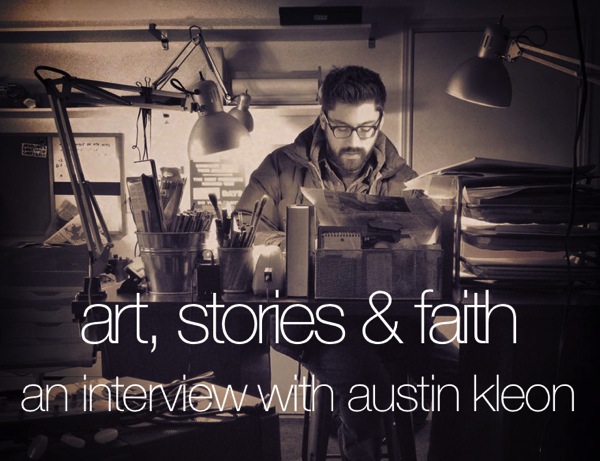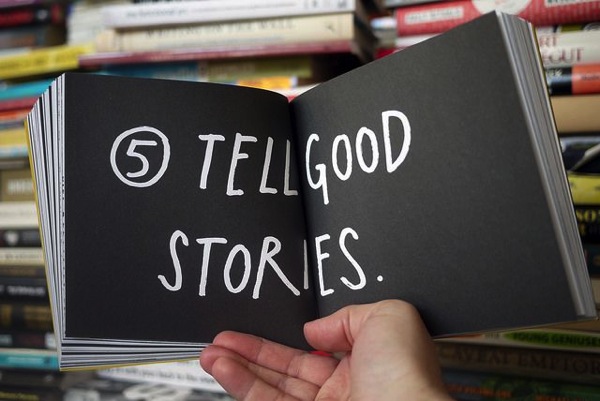Art, Stories, and Faith: An Interview with Austin Kleon
 Ministry is art. Some of ministry is what we traditionally think of as art: things like music, design, writing, and preaching. And some of ministry is less often seen as art: things like counseling, getting to know a student, or mourning with a family who has lost a loved one. All of these require creativity. They require the creativity in choosing what to say and what not to say. Creativity in deciding what stories to tell, how to tell them, and when they should be told. This is art; we are telling stories. We are sharing our own stories, the stories of others, and the story of Scripture.
Ministry is art. Some of ministry is what we traditionally think of as art: things like music, design, writing, and preaching. And some of ministry is less often seen as art: things like counseling, getting to know a student, or mourning with a family who has lost a loved one. All of these require creativity. They require the creativity in choosing what to say and what not to say. Creativity in deciding what stories to tell, how to tell them, and when they should be told. This is art; we are telling stories. We are sharing our own stories, the stories of others, and the story of Scripture.
This is the work of an artist.
I recently got a chance to talk with a brilliant artist and author, Austin Kleon and ask him some questions about art and faith and how the two interact. I’ve been a huge fan of Austin’s work. As a preacher and writer, I’ve been inspired by both Steal Like An Artist and Show Your Work. Since Austin just released his new book, which has already hit the New York Times bestseller list, I thought it would be interesting to ask him some questions related to creativity and faith. Although Austin doesn’t do his art for the church, I think those of us making art in our churches can learn a lot from Austin’s insights.
[gss-content-box color="gray”] Austin Kleon is a New York Times bestselling author. He has published three illustrated books: Steal Like An Artist is a manifesto for creativity in the digital age; Newspaper Blackout is a collection of poetry made by redacting words from newspaper articles with a permanent marker; and Show Your Work! is a guide to sharing your creativity with the world.[/gss-content-box]
ME: There was a day when religious institutions, like churches, were known for their art. Artists like Bach, Michaelangelo, and Da Vinci were inspired by their faith and produced brilliant work. What do you see as the relation between faith and art?
Austin: I was watching an old Curtis Mayfield interview in which he talked about all the music in him as stemming from the church. Chris Rock has talked about hanging out with his preacher grandfather, and what an influence he was on his work. Barry Hannah has talked about the influence of The Bible on his prose. Mary Karr talks a lot about her faith.
Those are all just randomly picked from my files. I think religion still has a major influence, if not an explicit one.
The church influenced me greatly when I was growing up. I was a member of a Methodist church, a very buttoned up, bland, harmless, business-like place, with handshakes, donuts, and coffee in the parlor. But there was a wonderful choir director there, and I sang in the choir until my voice changed and I quit. The music is actually what I remember most, and I think that's where a good deal of my love for it started.
If anyone has a direct line upstairs, it's my grandmother, and my other grandmother played organ and piano in the church. My dad has recently been saved and is singing in the choir and guest ministering. My uncle is an actual minister.
So the church has always been a big part of my life — and I'm sure it in some way, even if not consciously, runs through my work. My dad keeps telling me he hopes I become a preacher some day.
ME: Churches are sharing the same basic message every single week. How do you share something that has been shared by thousands of different people and thousands of times in a way that is inspiring?
Austin: Well, Andre Gide said everything has been said before, but no one was listening, so we have to say it again. I think it's the same problem a novelist has: there are only so many plots, you know? You just have to constantly "make it new" as Ezra Pound put it.

ME: In your book Show Your Work, you wrote,
“Every email you send, every text, every conversation, every blog comment, every tweet, every photo, every video - they’re all bits and pieces of a multimedia narrative you’re constructing. If you want to be more effective when sharing yourself and your work, you need to become a better storyteller.”
For people trying to figure out how to become good storytellers, what should they be reading, and watching, listening to?
Austin: They should surround themselves with good stories. They should read fairy tales, myths, and novels. They should watch great films, go see great speakers, listen when they're out in the world. My mother, for example, I never realized it until recently, but she's a really great storyteller. A natural. And somehow I never noticed until I actually became a student of storytelling. But it's very, very hard to get good at, and like everything else, takes a lot of practice. Some of the storytellers I’ve learned the most from are Carl Jung, Joseph Campbell, and Bruno Bettelheim.
ME: Churches as a whole in the United States are in decline. Do you think sharing art and telling a compelling story can help change this?
Austin: I honestly don't know. One of the most interesting books I've read on the subject recently is Alain de Botton's Religion For Atheists. de Botton's jist is that we should be able to steal or borrow many things that religion does well without subscribing to a belief in God. I think what churches could do is look at these things de Botton is pointing to, and to say, "Well, we already have these, and we do it well," and to emphasize those things.
I think this is why I'm interested in the practices of religion: the verbs. Singing, prayer, meditation, contemplation, service, etc. Personally, I am mostly turned off by the idea that faith is something that happens in the head and not with the body out in the world. I think what happens to a lot of artists is that they replace religion with art. A lot wouldn't ever admit that, but I think it's true. When I think of drawing or writing, I think of them as practices, or daily devotionals.
ME: One of your chapters in your book is called, “Shut up and listen.” The reformer Martin Luther once said regarding preachers that they should, “Stand up, speak up, and shut up.” What makes shutting up so important?
Austin: I would imagine that listening influences their art the same way that it does everyone: when you listen, you learn. You need input so you can continue your output. There was a great quote from Richard Ford, he said, when people know you're listening, they tell you things.